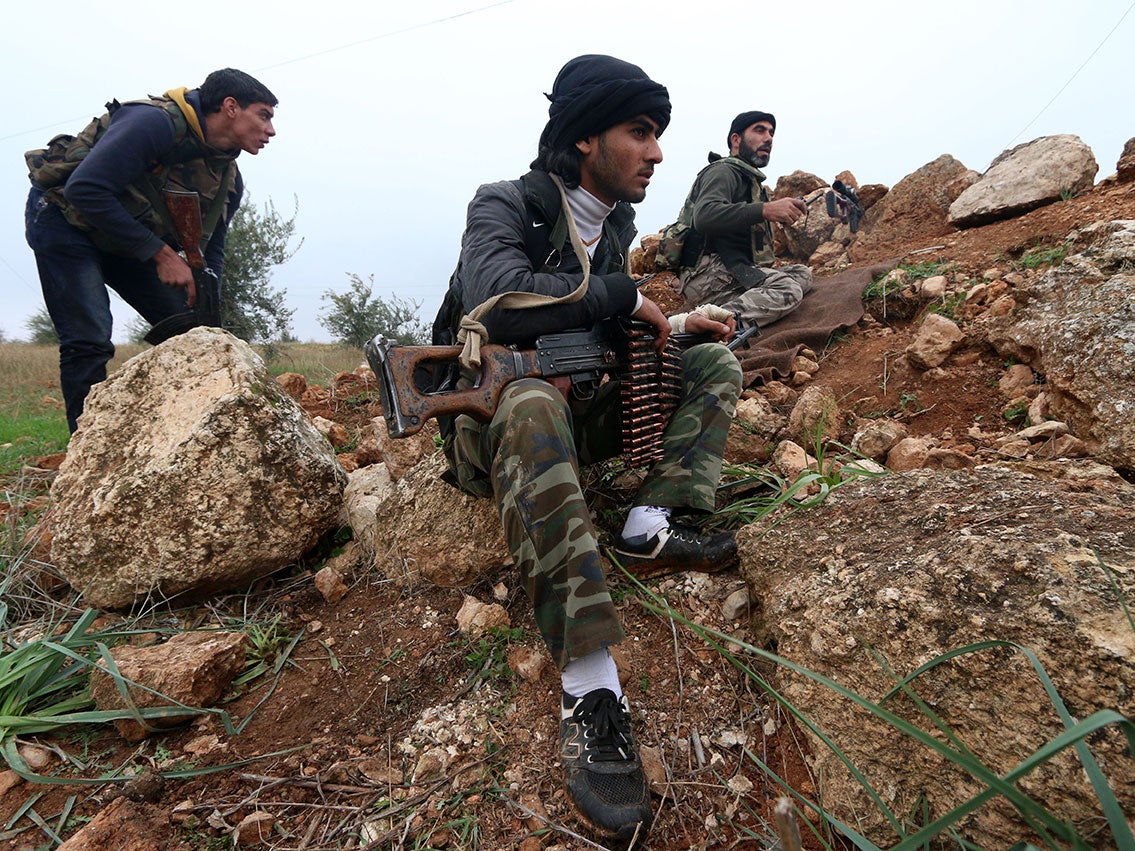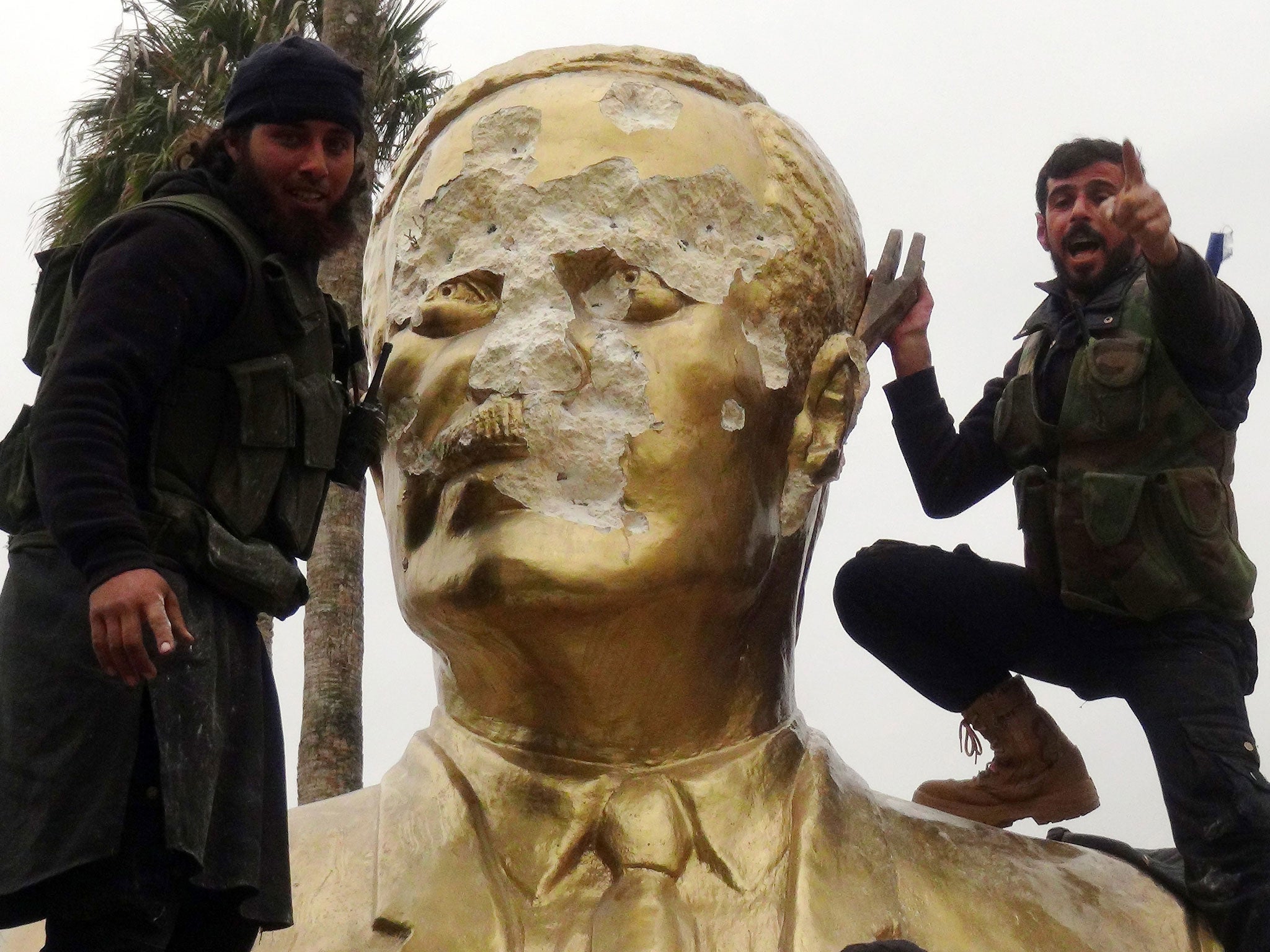'An army boot is placed on the face of the dead men': General Ghassan of the Syrian Army on the war against Nusra
It has been a personal war for these soldiers

Above us, white clouds graze the top of Tel Moussa, 9,400 feet of red rock above foothills of granite and valleys of innocent cherry orchards. Colonel Median of the Syrian Army’s 3rd Armoured Division stands on the dry, cold earth below, sun-shades above his stubble beard; he does not know the identity of the ancient Moussa who blessed this mountain with his name, but he knows how to curse him. “If I could catch him, I would hang him because he is the source of torture for me and many of my men.”
Across the gaunt peaks and caves of the Qalamoun range east of the Lebanese border, a kind of victory has been celebrated by the Syrian army after the sudden collapse of Palmyra to the “Islamic State”, a loss which – as they both admit freely — deeply shocked Median and his senior officer, General Ghassan. Months of fighting west of the town of Yabroud have freed a 25-mile front from the Nusra Islamists right up to the Lebanese frontier, and Ghassan’s 130-mm artillery are now dug in on the Syrian side of the border, scarcely 12 miles from the Lebanese city of Baalbek.
It has been a personal war for these soldiers: infantrymen along with paratroopers from the Syrian Republican Guard and the locally-raised “National Defence” militias – whose original creator was General Ghassan himself – and the hundreds of Lebanese Hezbollah fighters who also fought and died to the north of them on this same bleak mountain range. In one small village, as-Sarkha, Colonel Median lost 25 men, another ten climbing the slopes of Tel Moussa, two cut down by mortar fragments, three to mine explosions and five to sniper fire, and he claims — with a flip of the hand to take account of the obvious exaggerations of war – that an “estimated” 300 Nusra men were killed in the Syrian artillery, Mig fighter and helicopter ground attack rockets which took back this land.
At a jolly reunion in his headquarters at a marble-tiled villa in Yabroud, General Ghassan enthusiastically points to the local Syrian militia commander, a bespectacled, slim young man with short dark hair, and then hands me a mobile phone. On the screen can be seen the bodies of several bearded, half-naked, equally young men, their stomachs covered in blood. An army boot is placed firmly on the face of one of the dead men. When I examine the face of the boot’s owner on the screen, I realise it is the same bespectacled militia officer standing next to me. Yes, there were Syrians among the dead rebels, the soldiers agree, but there were also Chechens and Algerians and Saudis. Their list of foreign jihadis embraces much of the world.
They all debate the ferocious, throat-slitting executions of their Islamist enemies, a Saudi practice they all agree, which has nothing to do with the Muslim religion and much to do with money and warped ideology and the deliberate intention to put fear into their antagonists. “Of course, our soldiers are scared,” General Ghassan says. “There is a saying in Syria, that a man who does not feel fear is a donkey. But that does not mean he is a coward. We see the videos of the execution of our soldiers, yes, we know some of them personally, we know their families.”
And then General Ghassan speaks more quietly. “We have a soldier, his brother was murdered with a knife faraway in Idlib. They videoed themselves as they cut off his head and a man then put his foot on the head of the severed dead man and they sent the video to the dead man’s brother, my soldier.
“And my soldier, he climbed Tel Moussa with us in the attack and as he climbed under rifle fire, he all the time kept looking at his mobile phone and the picture of his brother’s head on the screen. And he wanted to capture a rebel and kill him for revenge, and when he reached the top, he captured a rebel. But he did not kill him.”
Much silence follows these words, and the horror of this terrifying war begins to fill the military village headquarters with its tables of slowly cooling tea and coffee cups. The general hands me another mobile phone image. It shows a row of Syrian soldiers kneeling on the ground, bearded after days in captivity, a “jihadi” executioner standing behind the man nearest the camera, a pistol pointed at the doomed man’s head.
“There was a garrison of 40 of our men in one battle in Idlib province, and 14 were killed in the fighting and the other 26 were captured,” General Ghassan says. “They executed them one by one, going from one man to the next to shoot him in the back of the head so that the others in the row would know what was about to happen to them. The question that haunts me to this day is what each soldier thought as death closed in on him, when he was three shots away, then two shots… It’s the same with all these prisoners, the Egyptian Christians in Libya who had their throats cut, the blood – do you remember how they said: ‘We are coming, Rome’?”
The soldiers believe there is a trained core of “head-choppers” who become mentally unhinged by their own executions, although the Syrian officers dispute whether the “jihadis” they fight are motivated by money or by a failed ideology. Listening to these soldiers – regularly interrupted by visiting militiamen, an intelligence officer, even the local female Syrian MP for Qalamoun – it’s easy to see how the war has changed them. They insist they will not stoop to the tactics of their enemies but when I ask Colonel Median what happens to the bodies of his antagonists, he looks at me coldly and asks: “What else do you want to know?”

During the battles, the colonel said, his men would have achieved victory far more quickly if they possessed the advanced American-made missiles which were in the hands of the Islamists. The Syrian soldiers listen to their enemies over their radios, noting how Nusra fighters identify themselves by nicknames. “They will call themselves by the names of birds,” General Ghassan says. “They will say: ‘This is the Robin’, or ‘This is the Falcon’. But the men from ‘Daesh’ (the acronym used for Isis ) use a first name, like ‘Abu Ali’ (father of Ali) followed by his country, like ‘Abu Ali of Morocco’ or ‘Abu Ali the Frenchman’.
When originally driving Nusrah out of Yabroud last year, Colonel Median now agrees that he called the rebels by mobile phone and gave them 24 hours to leave – to avoid casualties — but General Ghassan tells a darker story of the last few weeks. “There was a local Nusra man called Tahar Zeidan and I persuaded him to give up and come across to us with 700 men and hand over his weapons and trucks. But Colonel Median told me he was ‘a son of a dog’ and he was right. Before he came across, the so-called Nusra ‘governor’ of Damascus, Abu Ayub al-Iraqi, sent to him a Palestinian ‘emir’ called Abu Abdullah and said that in future Tahar Zeidan would be regarded as a local emir. So Zeidan broke his word and did not come to us – just for a title!”
The checkpoints on the roads to al-Jibeh sprout yellow Hezbollah banners as well as the red, black and white flag of Syria, and Colonel Median proclaims that “we and the Hezbollah are one in Qalamoun”. The way in which Hezbollah trucks speed through Syrian checkpoints in a cloud of dust does not betoken much brotherly love. But both must soon face a greater conflict further north of Tel Moussa — against “Islamic State” rather than Nusra forces. And after Palmyra, it’s a battle they need to win.
Join our commenting forum
Join thought-provoking conversations, follow other Independent readers and see their replies
Comments
Bookmark popover
Removed from bookmarks